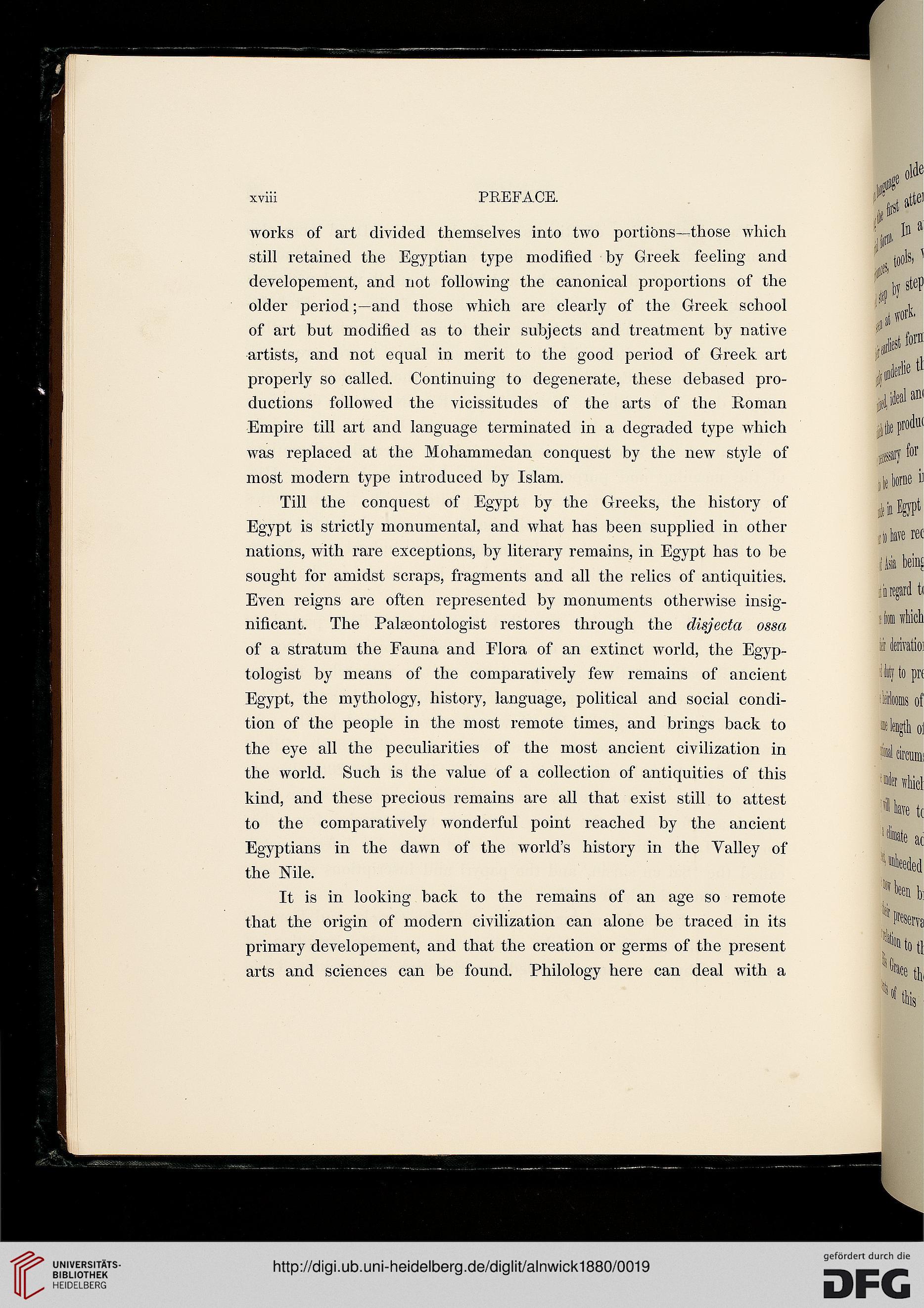xviii
PREFACE.
works of art divided themselves into two portions—those which
still retained the Egyptian type modified by Greek feeling and
developement, and not following the canonical proportions of the
older period;—and those which are clearly of the Greek school
of art but modified as to their subjects and treatment by native
artists, and not equal in merit to the good period of Greek art
properly so called. Continuing to degenerate, these debased pro-
ductions followed the vicissitudes of the arts of the Roman
Empire till art and language terminated in a degraded type which
was replaced at the Mohammedan conquest by the new style of
most modern type introduced by Islam.
Till the conquest of Egypt by the Greeks, the history of
Egypt is strictly monumental, and what has been supplied in other
nations, with rare exceptions, by literary remains, in Egypt has to be
sought for amidst scraps, fragments and all the relics of antiquities.
Even reigns are often represented by monuments otherwise insig-
nificant. The Palaeontologist restores through the disjecta ossa
of a stratum the Fauna and Flora of an extinct world, the Egyp-
tologist by means of the comparatively few remains of ancient
Egypt, the mythology, history, language, political and social condi-
tion of the people in the most remote times, and brings back to
the eye all the peculiarities of the most ancient civilization in
the world. Such is the value of a collection of antiquities of this
kind, and these precious remains are all that exist still to attest
to the comparatively wonderful point reached by the ancient
Egyptians in the dawn of the world's history in the Yalley of
the Nile.
It is in looking back to the remains of an age so remote
that the origin of modern civilization can alone be traced in its
primary developement, and that the creation or germs of the present
arts and sciences can be found. Philology here can deal with a
PREFACE.
works of art divided themselves into two portions—those which
still retained the Egyptian type modified by Greek feeling and
developement, and not following the canonical proportions of the
older period;—and those which are clearly of the Greek school
of art but modified as to their subjects and treatment by native
artists, and not equal in merit to the good period of Greek art
properly so called. Continuing to degenerate, these debased pro-
ductions followed the vicissitudes of the arts of the Roman
Empire till art and language terminated in a degraded type which
was replaced at the Mohammedan conquest by the new style of
most modern type introduced by Islam.
Till the conquest of Egypt by the Greeks, the history of
Egypt is strictly monumental, and what has been supplied in other
nations, with rare exceptions, by literary remains, in Egypt has to be
sought for amidst scraps, fragments and all the relics of antiquities.
Even reigns are often represented by monuments otherwise insig-
nificant. The Palaeontologist restores through the disjecta ossa
of a stratum the Fauna and Flora of an extinct world, the Egyp-
tologist by means of the comparatively few remains of ancient
Egypt, the mythology, history, language, political and social condi-
tion of the people in the most remote times, and brings back to
the eye all the peculiarities of the most ancient civilization in
the world. Such is the value of a collection of antiquities of this
kind, and these precious remains are all that exist still to attest
to the comparatively wonderful point reached by the ancient
Egyptians in the dawn of the world's history in the Yalley of
the Nile.
It is in looking back to the remains of an age so remote
that the origin of modern civilization can alone be traced in its
primary developement, and that the creation or germs of the present
arts and sciences can be found. Philology here can deal with a





